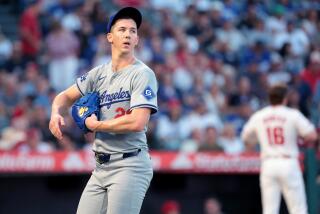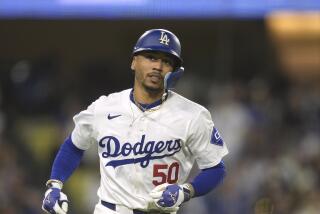The Dodgers say it all with their silence
I haven’t seen the books. I don’t know the budget. But I recognize the silence.
While other teams noisily scrambled through an Indianapolis hotel this week in hopes of improving themselves, the Dodgers were in an entirely different race.
The Indy 000.
No talk about improving the team through high-priced free agency or expensive trades. No talk about improving the ballpark through needed renovations.
And, most ominous of all, no Randy Wolf or compensation for losing him.
The only move they made at baseball’s winter meetings was to stick their general manager in neutral, announcing that Ned Colletti will be the first Dodgers baseball boss in Los Angeles Dodgers history to report to the money guy -- President Dennis Mannion -- instead of directly to the main guy, the owner.
“I’ve always believed both sides should work together,” Colletti said.
But working together toward what, exactly?
From the moment this team went directly from Citizens Bank Ballpark to divorce court in October, the Dodgers have continually claimed they would still conduct business as usual.
What happened this week is certainly not usual.
For the average fan, what happened with Wolf should be scarier than any ticket-price increase.
The week was highlighted -- or lowlighted -- when Wolf signed a three-year, $29.75-million deal with the Milwaukee Brewers.
Wolf was last year’s most consistent Dodgers starting pitcher, their playoff opener starter, with an 11-7 record and 3.23 earned-run average. The Dodgers thought he wasn’t worth a multiyear deal, and, considering he’s 33, that’s understandable.
Incomprehensible, however, is that they didn’t even make him an arbitration offer -- essentially a one-year deal -- which would have ensured they received two picks of next year’s amateur draft as compensation for his loss. With one stroke of the pen, they turned down a chance to add an extra sandwich pick between the first and second round, and a second-round pick, both potentially valuable pieces of an organization’s foundation.
The reason? It could only be money.
It’s unclear whether the Dodgers have the money and won’t spend it or just don’t have it. But it’s all about the money.
By not offering Wolf arbitration, they eliminated the chance that he would take them up on their offer and end up with a deal probably worth $12 million to $13 million.
Also by not offering him arbitration, they eliminated the high price of signing those two high draft picks, which would have cost them at least a couple of million bucks in bonuses.
Business as usual?
Last year they offered arbitration to pitcher Derek Lowe before he signed with the Atlanta Braves, and thus picked up two high draft picks in the process.
How important are those picks?
Clayton Kershaw, James Loney and Chad Billingsley were first-round picks, Jonathan Broxton was a second-round pick, and Matt Kemp was a sixth-round pick.
It is one thing to refuse to pay for free-agent pitcher John Lackey. That’s just being frugal.
It’s another thing to refuse to pay for the sort of kids who one day could help you avoid the need for a John Lackey. That’s being dumb.
“We didn’t know what would happen there,” explained Colletti of the Wolf arbitration decision, which was made before the winter meetings. “There was no way for us to know how it would go, or where he was going to go.”
Colletti is being the good soldier here, because, c’mon, if a team signs you as quickly as the Brewers signed Wolf, especially in a pitching-poor market, surely the Dodgers had a hint that he would be snapped up.
“We didn’t know that,” Colletti said. “And if he decided to stay, the deal we would have had to make would have been a lot for us.”
Not wanting to risk keeping Wolf could be argued. Failing to feed the minor league system cannot.
If there is eventually a paper trail leading to possible Dodgers’ economic problems, it starts here.
It starts not only with risking the club’s future, but with the front-office restructuring that puts a business layer between Colletti and owner Frank McCourt.
Time was, general managers such as Al Campanis and Fred Claire reported only to Peter O’Malley, and the club’s commitment to baseball was unquestioned.
Today,despite two consecutive division championships,that commitment suddenly seems as uncertain as those new stadium clubhouses and revamped stadium concession stands.
The next important off-season milepost is long-term contract negotiations with some of the Dodgers’ good young players.
Championship teams keep their kids with these kinds of deals. Failing teams can’t make the deals, and lose the kids.
Colletti said Thursday, “We’re going to have some conversations, and we’ll see if we can’t do something,” with agents for some of the young Dodgers. While Colletti wouldn’t reveal the names, they are believed to be Loney, Broxton, Kemp and Andre Ethier.
Listen for these talks. The Dodgers need for you to hear these talks. So far, the silence is deadening.
twitter.com/billplaschke
More to Read
Are you a true-blue fan?
Get our Dodgers Dugout newsletter for insights, news and much more.
You may occasionally receive promotional content from the Los Angeles Times.










